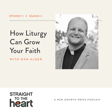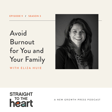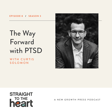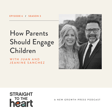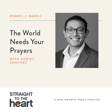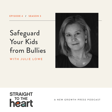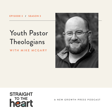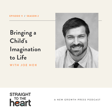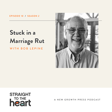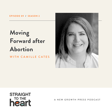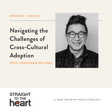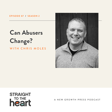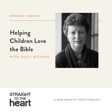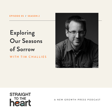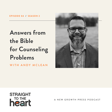Recognizing Personal Faults and Struggles
00:00:00
Speaker
Yeah, I think what the Lord has just really impressed upon me and I'm just so grateful for, is particularly working with oppressive marriages. It's really easy and tempting to say, I'm not that bad. Like I'm not that entitled, I'm not that cruel, I don't manipulate, right? And the Lord just be like, not so fast, right? You're more like that than me.
Introduction to 'Straight to the Heart' Podcast
00:00:29
Speaker
I'm Rush Witt and you're listening to Straight to the Heart, a podcast from New Growth Press. Each episode includes interesting talks with leading authors and thinkers. We hear who they are, what they think, how they approach their important work in ministry, and the moments and influences that changed their lives.
00:00:48
Speaker
Today, I hung out with Darby Strickland to learn more about her family and ministry in trauma and abuse care. Darby is a wife and mother, as well as a faculty member and counselor at CCEF, the Christian Counseling and Educational Foundation. She's a contributor to becoming a church that cares well for the abused
00:01:07
Speaker
and is author of Is It Abuse? Her newest book is Something Scary Happened, which helps children process their feelings after experiencing trauma.
Insights from Trauma Conference
00:01:17
Speaker
I asked Darby a bunch of questions about the challenges of abuse counseling and how God has grown her through it all. This is Straight to the Heart. Yeah, no, it's a good day. The sun is shining, it was driving into work, and the birds were chirping.
00:01:36
Speaker
It was just sweet to be out in, I love this time of year, just creation is beautiful. Yeah. Yeah. It was, I woke up this morning where I live in Ohio and it was 56 degrees. That's cool for summer. It's pretty cool. I mean, it's been really hot lately, so I've been, I've been happy, happy about that. So I'm curious also kind of what's been going on in life, things that are really going well that are making you happy and,
00:02:03
Speaker
No, that's a great question. I just came back from Wyoming, actually, and I did a trauma conference out there for the Refuge Ministries, which deals with women in domestic abuse. And I got to co-teach with Rachel Dunn Hollander, which was just such a sweet time, and being able to interact with victims in a small, intimate setting. I just felt really blessed by them sharing their stories.
00:02:30
Speaker
So what does that kind of time look like? What's the structure of the time that you spend with people who are there? Yeah, I really love the way they set up this conference. On Friday night, Rachel and I sat down and had dinner with their small group that they normally have at their refuge. So just gave that personal touch, which you don't normally get at a larger conference or speaking situation and really just got to hear from the women's hearts.
00:02:56
Speaker
And then because they are so out in Wyoming and so remote when they had us there, they had us work really hard.
Misunderstandings about Trauma in the Church
00:03:02
Speaker
So we delivered about eight hours of content. So that's not typical, but it was a pretty intense day. And just sharing, we were talking about what is trauma, how does it impact you, your body and your mind and your children. And it was, it was just, I felt like when we left the church got a lot of feedback saying,
00:03:23
Speaker
this church loves victims. And so that was just sweet to hear. That is really sweet. As you have those experiences at conferences, especially in different places, do you find that there is a real lack of resources for people who have been through abuse or going through other hard things? And do you find that there are certain parts of the country where it's even less? And why do you think that is?
00:03:49
Speaker
Yeah, that's a good question. I think trauma and abuse are just, we just don't understand them. If you haven't been through it, I just don't, whether you're a Christian or non-Christian, it's really hard to understand the amount, the impact that it has on somebody. And so I think we all have a lot of misunderstandings about how someone is dealing with extreme suffering.
Understanding Others through Biblical Counseling
00:04:13
Speaker
And yeah, I don't know that it's regional per se. I know that the church, we have such a great hope, right? And we have such great promises from scripture. We often struggle to let victims be in that season of lament for a longer period of time because we want to see them whole and reclaiming those promises. So we often get ahead of sufferers. That reminds me in the earlier days of my
00:04:42
Speaker
training and becoming a biblical counselor, I said, I heard, and I also said some things like, you don't have to go through what someone else is going through to understand them because I have a Bible.
00:04:58
Speaker
And while I think there absolutely is a certain truth to that, the Bible speaks to all of our experiences and it gives us the ultimate truth. I feel like I've kind of, I had kind of pushed that pendulum a little too far and minimized what you were just saying, which is the value of being able to, or having experience with someone else's going through.
00:05:23
Speaker
Now, that's a great point. I have to remind myself often that Psalms were not written in a day, right? Because as we read things in Scripture, we hear someone questioning, crying out to the Lord. And like 20 verses later, it's resolved. Their hope is restored. And we have to remember that's probably months, maybe years of someone's wrestling before it's formed in that poetry. And so even as I think as we read the canon, because we value it so much, we don't immerse ourselves in.
00:05:52
Speaker
What would that actually have been like to write that, to live that out at a human pace? Wow. I've never thought about it in those terms before. That's actually really profound and helpful to me. So I appreciate that. Yeah, the Psalms were not written in a day. And yeah, that's one of the challenges. I, you know, I really feel like you said just growing to enter the world of other people and
00:06:19
Speaker
to understand their needs so that I can bring them Christ in their answers is, you know, ongoing challenge for me like it is, like it is for everybody. Yeah. And I see that with my kids, right? Like when my kids are sad, I'm just wanting to swoop in and make it better.
Advice for Parents on Children's Trauma
00:06:32
Speaker
Right? It's like, it's not okay that they're sad, but
00:06:35
Speaker
It actually really is. Yeah. Yeah. Well, I wonder how do you because you do a lot of ministry with parents of kids who are going through difficult things. How do you coach parents to talk with their kids about traumatic experiences and other hardships and difficulties that they're facing? Yeah, I think just like as I and you would study the people that we're caring for, like we want to be a student of them.
00:07:04
Speaker
I just really encourage parents to kind of slow down and like, what is your child trying to tell you? Either through their behavior or their words or their withdrawing. You really have to learn about how your child's the way they're going through their suffering. Again, we often as parents want to swoop in, fix things. And instead I want parents to draw their children out and give them permission to feel all the feels, which is uncomfortable. And so,
00:07:34
Speaker
Yeah, that just takes a different pace, particularly because when children are struggling, the chances are the parents hurting over a similar thing.
00:07:43
Speaker
Yeah, it seems that with a lot of good work that you've done and Chris Moles and others that we're becoming even more acquainted with difficult traumatic experiences that impact us. And so even for most people, probably the word traumatic is kind of general.
00:08:05
Speaker
and and difficult to pin down what exactly that means. And so I think it could be helpful for somebody with so much experience as you. What are some of the common traumas that you are help people with? Yeah, with me in particular, I focus on abuse. So particularly domestic violence or overcoming childhood sexual abuse. Those would be more of what I would call relational traumas when somebody was in a position of trust and they either violated you physically
00:08:35
Speaker
or were so cruel to you emotionally and that they wanted to, you know, gain something, I would say devour you for their own gain. Yeah. And so I tend to deal with a lot of relationally based traumas, but there are traumas, you know, taking care of people who have been victims of crimes or house fires or weather events. So really the type of trauma is going to have a different response and person to person. Similar traumas can have different responses.
Counseling and Personal Growth
00:09:04
Speaker
So it's a really difficult thing. I think we really don't understand why some people are more impacted and other people are less impacted by particular events.
00:09:19
Speaker
I think it's obvious that trouble and hardships that we face often make us aware of our weaknesses. And when you're in a ministry, a channel of ministry that has you so often in contact with hardship and trouble,
00:09:36
Speaker
I wonder how that has made you aware of your own weaknesses. I find that as I do counseling. I find that the walking with people doesn't help me just understand them, but it helps me to understand myself and maybe places that I need to grow. We start talking about something from scripture that bears upon their life. And then I realize, well, that really bears on my life. Like I should, I need to do that, you know, or, um,
00:10:06
Speaker
move in that direction. What's that been like for you because you have so much opportunity to be ministering, so much opportunity to minister to people in hardship? Yeah, I think what the Lord has just really impressed upon me and I'm just so grateful for is particularly working with oppressive marriages. It's really easy and tempting to say I'm not that bad.
00:10:31
Speaker
Like, I'm not that entitled. I'm not that cruel. I don't manipulate. And the Lord just be like, not so fast. You're more like that than me. And so I've just been really convicted. Yeah. When I encounter things, and particularly with oppressors, they're so blind to what they're doing is wrong. It almost has scared me as a person. I often come home to my husband and be like, what am I missing about myself?
00:11:00
Speaker
You know, help me understand, or even to my children. Children are honest, right? So we can ask them about our blind spots. So I've just been really convicted. Yeah. I want to live a life of repentance. And when I see reflections of things, I need to be asking, how am I more like that than not? And then, um, and being comfortable being needy, I think is the other thing, right? Abuse ministry is so overwhelming, right? I can't fix it.
00:11:27
Speaker
I'm highly dependent upon the award. It's overwhelming. I can't bear these stories on my own. And so I've just decided I just have to be okay with being afraid and being needy. And I think those two things have helped me persevere in recognizing, yeah, I'm not just needy for my sin, but I'm needy to find my
Life Council Bible and Gospel of Grace
00:11:52
Speaker
joy. I'm needy in where I'm competent because it's really not what I'm doing.
00:11:56
Speaker
It's what the Lord has chosen to do.
00:12:02
Speaker
Receiving the counsel of God's word is essential to every Christian life. And so I want you to know about the Life Council Bible, practical wisdom for all of life. In the midst of challenging seasons of life, there is hope. The CSB Life Council Bible, developed in partnership with New Growth Press, is designed to equip readers with biblical truth and counsel on a wide range of topics and tough life issues related to relationships, marriage, parenting, and more.
00:12:32
Speaker
This Bible is full of useful tools and resources for life application and discipleship grounded in the truth of the Gospel of Grace. It contains more than 150 full-length articles from respected Christian counselors and scholars such as David Palleson, Ed Welch, Paul Tripp,
00:12:52
Speaker
Elise Fitzpatrick, Bob Kellerman, Diane Langberg, and many more. It also includes over 100 word studies focusing on key words from the Bible, which are applicable to personal healing, growth, and counsel. To learn more about the Life Council Bible, practical wisdom for all of life, visit NewGrowthPress.com.
Comfort in Discomfort
00:13:19
Speaker
Darby, that must be something that God really wants me to know because I've had so many conversations in probably the last two weeks where that exact, almost exact phrasing has been used. And every time it's used, it sort of sticks on me of being comfortable, learning to be comfortable, being uncomfortable.
00:13:42
Speaker
Yes. And I've heard that in probably three or four different contexts. And so I think that's something I must need to grow in because it keeps coming up and now you've said it. But that's what's so great about our God, right? When He wants something, He just keeps
00:14:01
Speaker
Yeah. Pursue announces. Yeah. He's telling me over and over again. I'm surrounded. Yep. You've got me surrounded. So yeah, I wonder with that, you know, I want to learn, I want to grow to be comfortable, being uncomfortable in the right kind of ways. And in your life and experience, how has that become more natural to you? What has, how have you grown in that?
Darby's Ministry Journey
00:14:30
Speaker
Right. I think it's by necessity, right? So here I am a homeschooling mom. I work in council at CCF one day a week, and I now have all these women that I'm caring for that are oppressed. And the Lord just starts opening door after door after door that I'm not equipped for. I'm not a writer. I used to totally shake when I spoke publicly. Like everything he has asked me to do was fear and trembling.
00:14:57
Speaker
And my husband kept saying, the door's open, you need to go do this. And I'd be like, I can't, right? So I think I'm just was very aware. I didn't train or prepare to do what I'm doing. Um, and so I'm very, I'm very needy all the time. Yeah. I need, uh, I need to grow in.
00:15:17
Speaker
It's interesting to me that you just mentioned how speaking and writing and other aspects of ministry don't feel like they come naturally to you.
00:15:29
Speaker
And yet you're doing them. And the Lord has really blessed you with a multidimensional ministry life. And I think that's a really beautiful thing. And I think it's a really encouraging thing for people to see because the average person, if they have an aspiration to serve other people,
00:15:53
Speaker
in a particular way, they may look at others doing it and say, oh, I'm not really like that person. I can't get up there and speak publicly or I can't write books or I'm really scared to do this or that. I'm not that kind of person. But the interesting thing is by what you've described and the way I see my own life, you're not that kind of person either. And I'm not that quote kind of person. So it means we're looking at it the wrong way.
00:16:22
Speaker
Yeah, I think what I've come to understand is God has put particular people on my heart and I had no choice but to help them and to represent them and to learn how scripture speaks to them and go to their churches for them. And so I think of it as I'm very hyper local. Like everything that I'm doing is because someone in particular had a particular need that the Lord just said, this is what I've given you to steward. And yeah.
00:16:51
Speaker
So there's not much of a choice at that point.
Complexities of Abusive Relationships
00:16:54
Speaker
You understand that you're recruited and then it becomes something beautiful that you're doing and you enjoy it more than you fear it.
00:17:04
Speaker
That's exactly the way it seems like it happens. For so many people, for me, I really resonate with that, that it's usually I'm sort of in need of answering some kind of call. I don't necessarily feel like I have what it takes, and maybe I don't, but it's not, you know, it's ultimately the Lord's going to work through that, and then we grow in the process. That is a really amazing reality of the Christian life and ministry,
00:17:34
Speaker
You know, people who might not be involved in counseling and ministry as you are struggle to see the difficult realities of abuse ministry. And I wonder, what do you think is a common misconception that onlookers have, which you think would really help all of us to care for people more effectively if we could understand this misconception better? Yeah, I think one of the things
00:18:04
Speaker
that people who walk alongside abusive marriages in particular think they think a victim has choices that she does that are not easy for her. So they don't understand either why she just doesn't leave, right, which or why she just doesn't didn't get help sooner, or why she isn't speaking out more. They look at her responses to being oppressed, and they judge her responses because
00:18:33
Speaker
they don't understand addressing abuse actually makes things worse for her and her children.
Ministering to Abuse Victims
00:18:39
Speaker
Coming forward makes things more difficult, right? Addressing someone confronting the oppressive husband makes him more upset, typically. And so I think we fail to understand any choice that they have is pain. And they really need to pick how they're gonna walk that out faithfully before the ward.
00:19:03
Speaker
Or they don't understand, they think, oh, she's just not loving her husband enough. She needs to be more patient. They don't understand how many marriage books she read, how many prayers, how much she herself wants to see her husband redeemed and changed. I think another misconception is she wants to flee and get a divorce, where most of these women want nothing more for
00:19:30
Speaker
their husband to see the harm and to stop so that their family can stay intact. So I think as onlookers, we, we can't imagine how awful it is and we can't imagine what they're going to have to go through. So we oversimplify kind of judge their reactions or their choices. Cause we think I would make those choices, but we're not enslaved, right? We're free. We have choices where we're not going to be punished or have to face more consequences of someone's wrath and anger.
00:19:58
Speaker
I think that's a really delicate part of trying to understand what's going on. If you're 20 feet away from someone, you're never going to truly understand what it's like for them.
00:20:14
Speaker
It seems a key theme in what you just said are the words, if she just, or if he just. And that's a real simplistic view of someone's situation if we were to put those words on it. If you would just, like, this is an easy thing to do. Why don't you just do what you're supposed to do or just make this decision?
Change and Redemption for Oppressors
00:20:37
Speaker
And yeah, that's,
00:20:39
Speaker
That's really that that's not it to your point that's that's not what it means to enter into another person's world. That's to kind of look from the outside but not to enter in and really understand the need of the moment and the nuances.
00:20:54
Speaker
And again, I mean, that's really a reminder to me that depending on the Lord as the one who is in control is essential because if I do enter this person's world, I'm likely to find a complicated situation and I just can't strategize our way out of it. You know, there's going to have to be a lot more patience and help and nuance to it.
00:21:20
Speaker
What you said a second ago made me think of a question that I think the answer can help me in especially abuse ministry. You said, you know, as you meet with other counselors and people involved in ministry to be able to be real and transparent about the challenges and yet to help each other not become cynical. I wonder how you guard against losing compassion for the abuser.
00:21:52
Speaker
in the sense, and that might be not the right way to say it, but, you know, to be able to still see opportunity to minister and the hope for change that sometimes can be very slim in appearance without losing it.
Parental Patience in Counseling
00:22:09
Speaker
Yeah, I was just working with a church yesterday and they have this oppressor in their midst.
00:22:16
Speaker
who now that they're dealing with the marriage, the oppressor's kind of turned against the session and now the session sees it, right? And so again, their temptation is, all right, now we have to call him out. And I was like, yeah, but we have to call him out in a way that demonstrates to him that we love him. And so we don't know who, two things I think about is we don't know who God's gonna change. And so every time I encounter an oppressive marriage, I have to think maybe this is the spouse
00:22:46
Speaker
that God will redeem. And I work earnestly in that direction. The other thing is just to recognize how much spiritual danger they're actually in, right? They're so blind to their sin and so self-righteous, they really don't see a need for Jesus. And if I can remember how needy they really are, right, I don't just want to tell them where
00:23:12
Speaker
They're sinning. I also want to give them rows of righteousness at the same time, right? So that, right, if you had to repent of so much heinous treatment, it would almost be impossible to own all that unless you truly knew your position with Christ. So yeah, it's having that balance. And then, you know, on a non-spiritual temptation, Chris Moll says this a lot. You don't want to power over someone who uses power, right? And so you want to demonstrate
00:23:42
Speaker
you know, serving them as well and what love looks like. I wonder, as you say that, it makes me think about how that kind of ministry requires what is very similar to a kind of parental love or mothering of someone because that's the kind of
00:24:07
Speaker
That's the kind of love that mothers show to their children, especially in hard things, to preserve the desire and the hope for change. And if we lose sight of that and I become a purely adversarial, then I lose that sense of hope. I lose that sense of ministry to the person or wanting to confront them or help them in ways that magnify a kind of love for them and a desire for
00:24:37
Speaker
for change. And so how has your role as a mother informed your counseling and ministry to people involved in abuse, whether abusers or being abused? Yeah. And how, I wonder, has that influenced your mothering? Yeah, I think just patience, patience, patience, patience, right?
00:25:04
Speaker
You know, a lot of parenting is repeating the same truths. And I don't want to be a parent who's shaming. So I do tend to have more of a nurturing teaching mode. And I probably counsel the same way. I want to highlight what's going well and build on what the Lord is doing instead of drawing attention to deficiencies.
00:25:33
Speaker
homeschooling, as you certainly know, it just requires so much patience, right? It's really inconvenient. It would be a lot easier to cook dinner and not teach someone how to solve a math problem, right? And so parenting is just, if I look at it as these beautiful interruptions, abuse ministry is the same way. There are these opportunities to relate, to get to know, to bring the gospel to,
00:26:01
Speaker
in really inconvenient moments, right? Crisis has never occurred in good times, a convenient moment. So I think those two things is, the Lord has just taught me to be more patient in both arenas. And as well, yeah, like children, right? I can do everything, I can show them everything, but it's ultimately up to how God is, right? How he's going to ultimately shape them.
00:26:32
Speaker
Yeah. So it takes, I think there's a similarity there as well. Sure. Yeah. Sounds similar to, uh, the way a farmer has to plant seeds and yet can't control the rain. It's waiting, praying, waiting for rain to
Resources for Children's Trauma
00:26:45
Speaker
fall. And that's the way a lot of ministry is or, but you know, at home, uh, or out in the counseling room or in an abusive family, uh, you know, we're really dependent on rain to fall. Yep.
00:26:58
Speaker
at the right time. That's right. Yeah. That's right. Yeah. Yeah. That's right.
00:27:07
Speaker
As we've been spending time with Darby Strickland, I want you to know about two more resources. First, the mini book, When Children Experience Trauma, what to do when something scary happens. When our children experience a traumatic event, we can feel powerless to help. But Darby Strickland wants parents to know that they are just the right people to help their children, pointing the way toward hope and healing.
00:27:32
Speaker
The second resource to know about is Something Scary Happened by Darby Strickland. Something Scary Happened helps children process their feelings after experiencing a trauma and provides comfort through the story of a little lamb named Miles. Miles is a happy little lamb until something bad happens.
00:27:51
Speaker
All of a sudden, Miles feels like he's alone in a deep, dark valley. But it's there in the valley that he meets his Good Shepherd who promises to always be with him, no matter what. Darby Strickland uses the story of Miles to help parents and caregivers share the comfort of taking their fears to the Good Shepherd by applying Psalm 23 to difficult experiences.
00:28:16
Speaker
Through a special section at the end of the book, Strickland helps parents recognize the feelings and behaviors children might have in response to their trauma and guides them in how to help children talk about what scared them. This is the first book in the Comfort for Children in Hard Times series, addressing difficult experiences that children commonly face and offering gospel hope and help.
Balancing Responsibilities and Scheduling
00:28:42
Speaker
Children ages four to seven will be drawn to the playful illustrations by Carlotta Notaro. You can learn more about both of these books at NewGrowthPress.com.
00:28:56
Speaker
Well, we've been talking a lot about difficult questions, you know, challenging, questions of challenging ministry. Here's a lighter question, I think. So you're doing so many things, homeschool mom, counseling, speaking, writing, other ministry opportunities, having a life, being a human being, you know, with a life to live, how is all of that happening?
00:29:23
Speaker
That's a great question. I'm still trying to figure that out most weeks and months. I think it is really wonderful having people in my home that I enjoy, that I want to spend time with, that helps me get out into the world. But I do have to really be mindful of my schedule. So I'm always telling my husband, we need to schedule something fun, right?
00:29:52
Speaker
and have to really guard that downtime in a sense. And that's been difficult in certain seasons because deadlines and trips or whatever. But when I am not mindful that I'm a human being who's limited, who also needs to rest and be restored and enjoy the life that God's given me, things get out of whack.
00:30:22
Speaker
And so yeah, I'm constantly tweaking my calendar as they say. Yeah. Do you have any hacks or habits that are really maybe just one that is been instrumental in managing just the busyness of family life or the busyness of counseling life?
Productivity Tips
00:30:43
Speaker
Um, yeah, I think one that's been really helpful to me is just not responding to emails in the morning.
00:30:53
Speaker
You know, I get my inbox becomes so full. Um, but if I do what I need to do for my family and deadlines and work, if I do those other things in the afternoon, that has really helped me be productive and not be sidetracked. Another thing I've done in the last year, I had to develop a new class for CCF. I had to write 50 lectures. Whoa. It was just this really intense season. Daunting. Yeah. Daunting on things I did not, you know, I really had to lean in and do some research on.
00:31:23
Speaker
is I set a timer. I was like, okay, Darby, you can concentrate for 45 minutes. Yeah. Yeah. And just put all the distractions and things aside and you can get a lot of really solid work done in a concentrated window and then take a break and then come back and set a timer. You know, otherwise when you hit a hard moment or I'm like, oh, I don't know what scripture I'd use for that, I'd be tempted to pick up my phone or go change the laundry.
00:31:50
Speaker
But that timer has really helped me in this last season. That timer has really helped me too. I think it's actually called the Pomodoro method. Have you heard that? No. So the Pomodoro method was invented I think by a guy maybe in Italy and the Italian word for tomato is Pomodoro. Yeah. And he had a little kitchen timer that was shaped like a tomato.
00:32:15
Speaker
And he would set the timer, now he would set the timer for 25 minutes.
00:32:21
Speaker
And you work focused on nothing except the task at hand for the solid 25 minutes. And then once it goes off, you set the timer for five minutes and you have a completely idle break. You can sit and stare at the wall. You do nothing. And then there is some, I guess, you know, science or whatever to it that that break is actually helping you to retain energy through the day.
00:32:49
Speaker
to be able to do more things. And when you do, I think four of those blocks of 25 minutes, then you take a 10 or 15 minute break.
00:32:58
Speaker
at that point. And that's been really helpful to me. That's probably, I mean, if I have one thing that I do every day, I use that timer, just like you do. Sometimes I do it longer, like you said, you know, maybe 45 or 50 minutes, because I feel like I can go a longer stretch. But the rule is, if you're doing the 25 minutes of focused work, and then you get distracted, you have to reset the timer.
00:33:23
Speaker
So that's a little bit more of the, you know, the method or the challenge. And it's pretty simple, but it really makes a huge difference.
New Resource for Abuse Ministry
00:33:31
Speaker
And so it's really helped me. Yeah. Yeah. It's really helpful. Really helpful. I have to get my great aunt's tomato kitchen timer out for my desk. Yeah. Yeah.
00:33:42
Speaker
Yeah, so Darby, tell me more about a new resource that's coming out that you've been a part of with Chris Moles, all about helping in this context of Ministry of Abuse. Yeah, it's a pleasure to be part of that project, Caring for Families Caught in Domestic Abuse, because many different voices or roles in abuse care, we all got together and wrote a resource that explains community care
00:34:11
Speaker
for a couple. So it addresses what an oppressor needs, what victims need, how he is an advocate. So it's really a robust how to think about church discipline in these cases. And so it has all these wonderful vantage points of different voices who would be ministering to different aspects of the problem coming together. And this is how we would work together in a church situation to care for that.
00:34:40
Speaker
I got to write a chapter on caring for children, because I often find that they are overlooked in these situations. So much time and attention goes to the parents, and it's a robust ministry in and of itself. But my heart is just really led for the littlest victims in that. And as I was writing that chapter, I recognized there's really very few children's resources on trauma.
00:35:07
Speaker
And so out of that, I just birthed this idea of writing this children's book, Something Scary Happened, to give parents a tool to talk about, yeah, how do we lean into the Lord and what does trauma look like through a child? So that was an exciting project to be a part of. And then it was fun because it birthed this other idea. It's just been a delight to do something light and beautiful and redemptive.
Closing Remarks
00:35:35
Speaker
Yeah, so important to be able to provide those are two vastly different resources that are available and useful. And it's just a beautiful thing to have the same kinds of truths being delivered to different, entirely different groups of people that need them so that they could be, could be utilized. Well, thank you so much for spending this time today. I really have enjoyed hanging out and learning and
00:36:04
Speaker
growing and hearing about your ministry and family. It's just great. It's fun. Thank you. It's good. You've been listening to Straight to the Heart, a podcast from New Growth Press. Our next episode releases next week, and I look forward to seeing you there.

